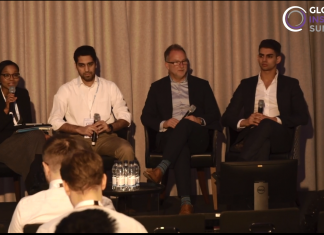Partnering with InsurTechs can be an expensive experiment, so it’s integral to ensure it’s the right fit for both the company and insurance firm, according to a panel at the Global InsurTech Summit 2019.
The panel at the Global InsurTech Summit, which included senior staff from Munich Re, Hiscox, AIG Life, AXA Next Labs Europe and InsurTech Gateway, discussed the benefits and challenges facing corporate investments and partnerships with InsurTech startups and scaleups.
Interest into the InsurTech space has skyrocketed, with last year witnessing $3.1bn being invested into the sector, according to data by FinTech Global. This figure is almost double the $1.6bn which had been funded over the course of 2017. Supporting this growth are dedicated InsurTech investors like InsurTech Gateway and Eos Ventures, but insurance firms have also been integral to this growth, with major institutions like AXA and Munich Re having their own dedicated venture capital arms. Other players in the field might not have specific venture departments, but all players are establishing partnerships. A recent example of this is AIG MEA which signed a deal with UAE-based Democrance which aims to support the digitalisation of AIG in the Middle East.
Richard Chattock, CEO at InsurTech Gateway chaired the panel and posed them the question “Are the insurance firms getting value for money by engaging with the startup market or is it just an expensive experiment which they could a better pursue internally?”
The general consensus from the panel was that partnerships with InsurTechs were very much worth all of the effort and expenses. Shelley Lyddon-Mills, head of M&A and ventures at Hiscox said stating that it can be an expensive experiment if you do not know what you want and are just looking for solutions without a specific need. While an InsurTech might look great on paper and have a great proposition, there is no point trying to wedge something in which is not needed just because they look nice.
She added, “We are running ideation processes, having full workshops and getting the business together to work out, that whilst there is are hundred pain points that we want to solve, what are the three we’re going to focus on first and what are we going to work hard on solving? That’s when it becomes not expensive and that’s when I think it becomes important to use InsurTechs and startups to help solve those problems, because they are faster, they are agile and they want to get some stuff done. They have a sense of energy that despite us all wanting to have, it’s really difficult in those big insurance companies to get those small things done.”
Finding out what burden the insurance firm actually wants to solve seems like a simple problem to fix, but there are various parts of an insurance firm which can be updated or have legacy systems replaced, so it can be tough to understand what takes precedence. On top of that, it’s coming to terms if the InsurTech would actually fit in with the insurer. Hiscox has not been a stranger to working with InsurTechs, having recently formed an agreement was formed with INSTANDA, a cloud software developer to support the distribution of insurance products. The partnership was made to support Hiscox’s growth across Europe by entering its commercial and personal lines through more distribution and service channels.
Richard James, partner engagement lead in Europe at Munich Re Digital Partners said, “I think that is a really good point that you say, is it the right partnership? And it’s for both sides. So, it’s not only, do I want to work with you as a startup? It’s does the startup want to work with you, because I might not be the best corporate to actually partner with. If you want something off the shelf, I don’t have things off the shelf to give you. We want to co-create, we want to build something new, we want to innovate, we want to stretch the boundaries. So, that’s where we really want to add value to the startup.”
There are a lot of discussions on the pros and cons of choosing to work with a specific financial institution. If a startup chooses to receive funding from a corporate investor, questions are raised on whether this impacts their ability to work with other clients in the same field or if they are essentially locking themselves into just one customer. On the reverse, it offers a startup much deeper and more industry-specific insights to the real challenges facing institutions and how they can be solved. So, choosing whether a partnership or investment is truly the right decision can be quite the conundrum and both sides need to be clear of the potential outcomes.
An opportunity of accelerating back-office processes or replacing existing manual processes with an automated version, is often a major factor when looking to work with an InsurTech. However, Nicola Dryden, partnerships director at AIG Life believes the main appeal is helping an insurer build something they could not do on their own.
An example she gave the audience was electronic wills. There is a lot of paperwork and steps which someone needs to go through when a relative dies; however, working with a FinTech using tools like blockchain, can ease these burdens. An insurer would then be able to store all of the policies in one location and have everything needed for a will located in a single location.
She said, “I think startups can be part of the whole value chain, and what we’re looking for is that expertise to bring it in for us to be able to make the customer experience so much better than it is today and bring it up more into the 20th century, which is what we are trying to do in the FinTech space. I think is really innovative and really quite exciting to try and change protection as much as it is a difficult subject to talk about. How you work with startups and what they bring to the table is really fantastic in terms of that experience and that learning and making the customer journey much more approachable to get it out there.”
Following the panel’s agreement that an insurance firm should look to for an InsurTech which solves a specific need. InsurTech Gateway’s Richard Chattock asked, “I would argue that the most disruptive and innovative InsureTech solutions will be ones that actually are going to compete directly with your incumbent business, and how do those founders find a partner where the incumbent markets don’t want to back a business that is going to eat their own lunch?”
Romain Champetier, business development manager at AXA Next Labs Europe responded to the question by stating there are not many InsurTechs which are looking to be a direct competitor with large corporates – Shelley Lyddon-Mills stated it is around nine per cent of InsurTechs looking to disrupt the entire value chain.
In China you have Zhong An which is building itself as a digital PNC insurer and Ping An, which is evolving from a technology company into the insurance space. Outside of that, particularly in Europe, Champetier does not think there are many InsurTechs shaping up to be direct competitors to the traditional institutions. He added, “I would argue that there is a form of complementary between large insurers like us, like the AXA’s and the Hiscox’s of this world, and those insurance technology companies that have very concrete needs to put their first products in the market. For us, that will help us, probably incrementally at first, digitalize our value chain and helps certain parts of the value chain.”










